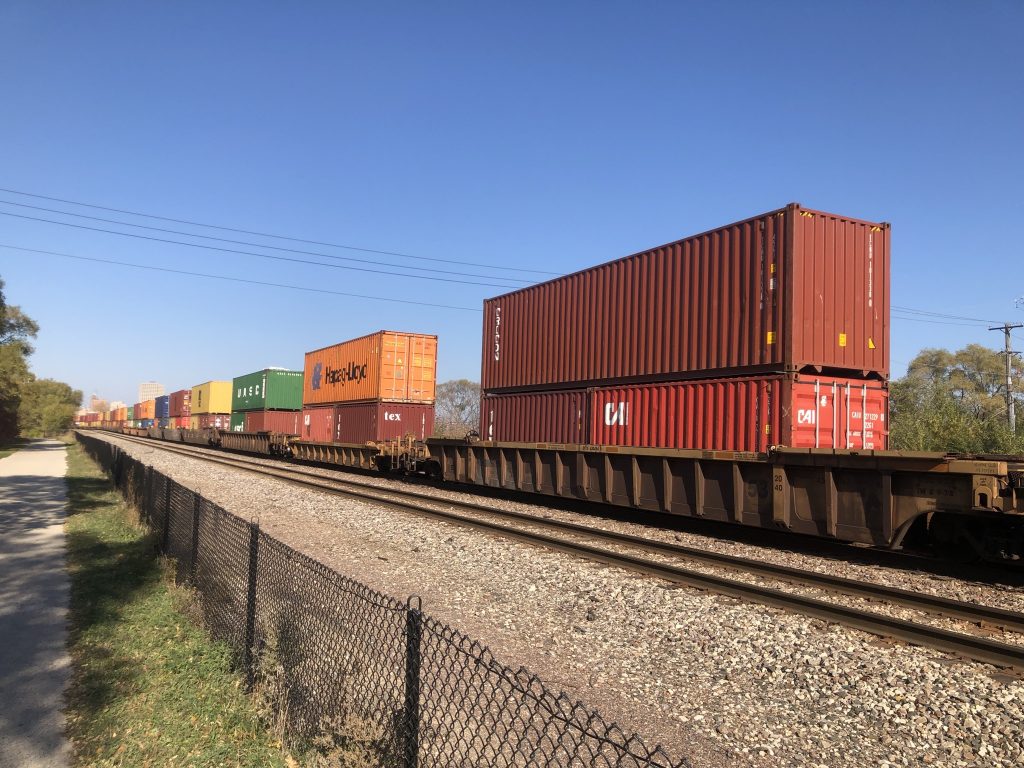How Wisconsin Businesses Are Navigating Tariffs
Changing tariffs and shifting trade negotiation deadlines have created challenges for Wisconsin companies importing and exporting goods.

Shipping containers on a Canadian Pacific train as seen from the Kinnickinnic River Trail. Photo by Jeramey Jannene.
Wisconsin’s shipping and logistics industry is at the front lines of helping companies in the state navigate Trump administration tariffs and global trade disputes.
At the customs brokerage M.E. Dey & Co. in Milwaukee, President and Managing Director Sandi Siegel works with businesses around the world to stay up to date on complying with the duties they need to pay to import and export their goods.
Most recently, President Donald Trump threatened tariffs of at least 20 percent on more than two dozen countries if they don’t reach trade agreements by Aug. 1. That includes the European Union, Canada, Mexico and Japan, in addition to the larger, ongoing trade dispute with China.
Siegel said the volatility has been difficult to manage, with changing tariff amounts and trade negotiation deadlines shifting from month-to-month.
She joined WPR’s “Wisconsin Today” to share what she’s hearing from the companies she works with and how trade in the state is being affected.
The following was edited for clarity and brevity.
Kate Archer Kent: How are your customers navigating the volatility of these trade disputes and tariff threats?
Sandi Siegel: In the short term, they’re trying to either get goods in or get goods shipped out before the tariffs change. But some of the announcements come with such little lead time, it’s difficult to even do that. A lot of importers who are affected by all these tariffs coming in were already looking at where they might move their manufacturing, supply chains and sourcing.
Those things don’t come quickly or easily. If you’ve got really complicated manufacturing, those sorts of things can take years to repurpose and find the right factories and tooling partners. But for those that can more easily adjust and make changes, they’re getting more serious.
I have one customer just this week we chatted with who was shifting their production to Japan and trying to get out of China, and now Japan’s being hit with one of the higher tariff rates. So it’s really challenging in such a volatile market.
KAK: What are your clients saying as they try to shift production and move their supply chains? Are there discussions about moving their manufacturing and sourcing onto U.S. soil?
SS: Everyone recognizes that’s the agenda of our government. But some of these industries are very difficult in the U.S and challenging. People that I have talked to in the manufacturing sector say the cost of doing business and manufacturing in the U.S. is much higher. The labor (cost) is much higher, and some of the skill sets are not there. The general consensus is, it won’t fill jobs. It will be robotics and automation, if and when we move some of this production back to the U.S.
KAK: Can you bring this down to the micro level in Wisconsin? Are individual consumers and households seeing the effects of these tariffs and trade threats?
SS: I ask customers myself when we meet and talk about the challenges. Are you passing on the tariffs to your customer? Are you absorbing it? How are you managing that? I won’t say all companies, but I’d say most companies can absorb, not happily, but they can absorb a 10 percent increase (from tariffs). When you start getting into some of these higher dollar amounts, like percentages for China and some of the other rate increases going on, that is a different conversation. They certainly are passing on those rates.
One of the bigger impacts that has been coming fast and furious is the (50 percent) steel and aluminum tariffs. We’re a heavy manufacturing community in Wisconsin, and their raw materials are being impacted heavily. My understanding is some of the steel and materials needed can’t be sourced even within the U.S. So there are some definite challenges there that certainly are increasing prices.
KAK: How well are customs officials tracking and enforcing these shifts as commerce comes in at the borders?
SS: All of the customs officials are tasked with ensuring proper duties are assessed, and they have ramped up. They’re making sure importers aren’t doing evasion and avoiding it, but at the same time, their programming is challenged to reconcile it all. So it’s really prudent for importers to be informed on what the proper duties are, and look for some of the legal loopholes in avoiding some of these tariffs and keep them to a minimum.
How latest Trump administration tariffs and trade disputes are affecting commerce in Wisconsin was originally published by Wisconsin Public Radio.
If you think stories like this are important, become a member of Urban Milwaukee and help support real, independent journalism. Plus you get some cool added benefits.





















